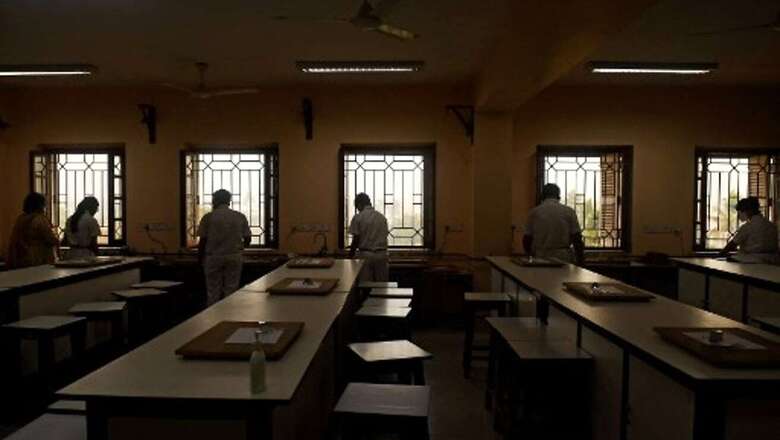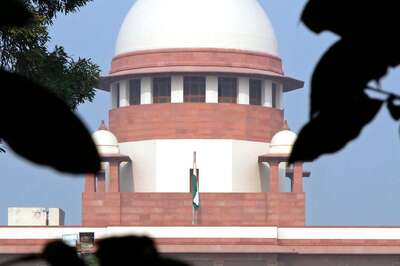
views
Educators, teachers and parents too would be seriously concerned about the new Board of School Education being created by the Delhi government, with three primary aims — to produce “kattar deshbhakts (fanatical patriots)”, good people and students not reliant on the job market for employment. In the present times of ‘kattar’ fanaticism disrupting democratic spaces of the young, one would imagine some caution in the stated aims of a new educational institution. However, as reported by the media, a strategic waving of the Deshbhakti (patriotism) flag has been happening in Delhi since 2019.
Days after the Delhi Chief Minister had supported the abrogation of Article 370 in Kashmir, on the eve of Independence Day in August 2019, he had announced the Deshbhakti curriculum. He had said children must learn about the glories of the country and their duty towards it. “We are poor, our farmers commit suicide. But who will solve these problems? It is us who will have to find solutions.” He added that as adults if they accepted a bribe, or jumped a traffic light, they must feel that they have betrayed ‘Bharat Mata’ (Mother India). Again days before the Assembly polls in February 2020, the Deshbhakti curriculum figured prominently in the election manifesto of the Aam Aadmi Party.
The farsighted recommendations of the Secondary Education Commission in 1952, after a traumatic and divisive partition, had warned that Deshprem, the “love of one’s country must not degenerate into nationalistic jingoism”. It said schools must help develop a critical appraisal of a nation’s realities; true patriotism involved “a readiness to recognize its weaknesses frankly and to work for their eradication”. Indeed, “students should learn the great truth that an appreciation of what is good in one’s heritage is one aspect of patriotism, but equally so is the rejection of what is unworthy and the desire to improve it. There is no more dangerous maxim in the world of today than “My country right, or wrong”. The whole world is now so intimately interconnected that no nation can or dare live alone and the development of a sense of world citizenship has become just as important as that of national citizenship”.
There has been much international debate and research on dealing with patriotism in schools. Educators caution that it is best to present it critically as a ‘controversial’ theme, and not influence students’ emotions non-rationally, through rhetoric and psychological means. A study in London had found that teachers and 13-year-old students asked for neutrality on such issues, and questioned a moralising curriculum, which could give rise to racism or social division. Teachers called for a focus on universal humanity, and warned against brainwashing. A teacher said making value judgments on patriotism “is as bad as telling everyone they’ve got to be a certain religion or they’ve got to live a certain way or they can’t eat meat. That is not my role as a teacher: my role is to educate them and then they make their decision.”
A poignant response of young British students was that patriotism lessons did not allow them to question their own country. Some said that if in 1947 England had taken a different approach while leaving India, history would have been different, without such violence and hatred. Surely many of our teachers and students would have similar sensibilities to question ‘kattar’ or fanatical notions of patriotism and think and feel for others, beyond borders. We sincerely hope the Delhi government will appreciate such empathy and encourage its young students to critically question narrow jingoism, while engaging deeply with larger humanistic concerns.
However, the trend to keep adding new subjects or curricula under various banners — such as Happiness, Entrepreneurship, The Constitution at 70, or Deshbhakti, or others to come — is not the most effective way to focus on these ideas. Most of our policies and the National Curriculum Framework 2005 have advised that there is a need to integrate such themes across the curriculum of all existing subjects, instead of suddenly introducing separate ones. But as the media reports reminded us of a possible electoral strategy for the Deshbhakti curriculum, the Delhi government seems to openly use these curricula to garner public attention. Indeed, it even gave an order to schools listing these themes for their annual functions. So some school in-charges were rather confused about what song and dance could possibly be done on the ‘Happiness Curriculum’, or ‘Teachers Training in Oxford’. Indeed, a recently commissioned study by the Boston Consulting Group points out that educational reforms as an electoral strategy contributed in some measure to the government’s re-election.
Another rationale given for a separate Board of School Education for Delhi is the need to adopt a comprehensive assessment system across the year. There has been much expectation from the government to give serious consideration to this aspect of the curriculum. However, over the years its policies on assessment and pedagogy have been found to be very problematic. Testing for labelling and segregating the ‘weaker’ students into separate sections, as early as in Class 3, offering them mechanical drill and memorisation-based teaching methods, with a ‘diluted’ examination, is not the best way to ensure equitable inclusive education. Discriminating against children on the basis of tests not only violates their rights but has led to demotivation and a feeling of inferiority as pointed out by teachers and researchers. Moreover, this is not how learning can actually happen.
In its keenness to show ‘good’ Board results, Delhi has pushed out thousands of its ‘weak’ students into the Open School, placing the responsibility on the most disadvantaged to grapple with the challenges of distance learning, which many cannot do. Recently a video went viral of the Director of Education in Delhi, telling teachers how to ensure most students pass the examination. He said that of the 20 marks for internal assessment he believes all should get at least 19. For the remaining 15 marks to pass, he offered tips such as telling students who do not know the answer to just repeat the question, or write it in Hindi, which will get 1-2 marks. At a meeting with Class 12 students he assures them of having spoken to the CBSE to be lenient in marking. Teachers and parents have been alarmed with this advice from the highest quarters. With such strategies to ‘crack’ Board examinations and ‘display’ high pass percentages, daily advertised on the media at presumably huge costs, there are genuine concerns about the government’s move for its own very small Board.
Read all the Latest News, Breaking News and Coronavirus News here




















Comments
0 comment